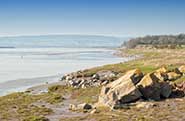The three-year project, which begins in October and will be pursued with co-investigators at the University of East Anglia (history) and University of Nottingham (geography), consists of three strands that focus on environmental ‘connectivities’ rooted in matters of power and energy.
Strand one, based at Bristol, focuses on river systems and their linked bio-physical, energetic, commercial and cultural flows, to be pursued through case studies of the transformation of the Tyne, proposals to harness the tidal energy of the Severn estuary, and questions of access and recreation in watery environments.
Strand two, based at UEA, will explore infrastructure and energy systems and their connected sites of generation, transmission and consumption, with reference to the emergence of the national grid and the energy environments of twentieth-century Somerset (including Hinkley Point and recent proposals for induced hydraulic fracturing to release gas in the Mendip Hills).
Strand three, based at Nottingham, will investigate the infrastructure of constructed watercourses and how they connect notions of natural and cultural heritage, with reference to soughs (artificial rivers) in Derbyshire’s former lead mining district.
‘The Power and the Water’ aims to offer a fresh perspective on Britain’s environmental history, emphasizing subject areas, themes and approaches less visible in the existing literature.
Another central objective is to make a substantial contribution to the training of the next generation of environmental historians in Britain, and, by inserting early career scholars and project students at the project’s heart, to assist the development of future research leaders who approach urgent questions of environmental change and sustainability from the perspectives and methodologies of the arts and humanities.
The investigators have already worked together in recent years on two smaller AHRC awards for which Professor Coates was principal investigator. In common with these previous undertakings, the new project is supported by a range of project partners, including Northumbrian Water plc, the National Trust and Quantock Hills AONB service.
Professor Coates said: "Since 2005, when the AHRC launched its five-year ‘Landscape & Environment’ programme – a programme I benefitted from by running a project on ‘Militarized Landscapes’ with my colleague, Professor Tim Cole – it has been a really good time to be an environmental historian in the UK.
"The AHRC has built on the momentum established by that programme through various related funding initiatives on themes such as 'living with environmental change'. It is now widely recognized that arts and humanities perspectives can improve our understanding of complex and highly topical issues arising from our planet’s current and future environmental condition."
Professor Coates is also contributing to the follow-on phase of the UK National Ecosystem Assessment with a project on the cultural services of ecosystems, funded by DEFRA under the auspices of the Cambridge-based World Conservation Monitoring Centre.
